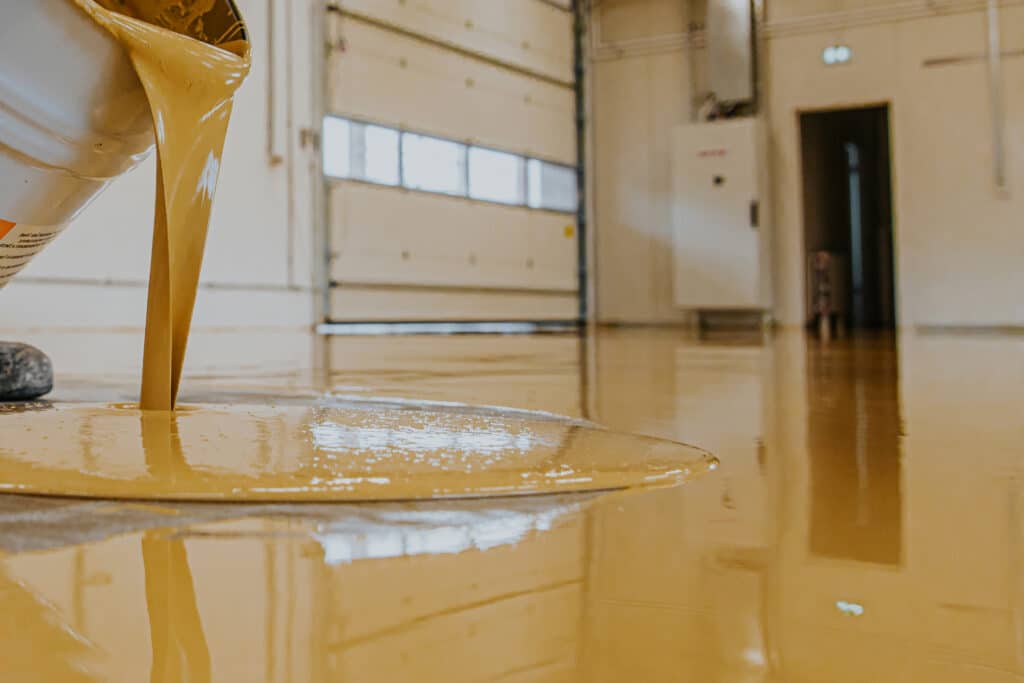Looking for an easy way to elevate your garage? A simple garage floor coating could be your answer. But if you’re wondering what the best garage floor coating is, things get a little more complicated. In short, the best garage floor coating for you will depend on a number of factors.
Generally, floor coatings are used as protective layers for concrete. While they are typically used in garages, they can also be found in other applications like basements, kennels, salons, showrooms, medical facilities, warehouses, and other high-traffic areas.
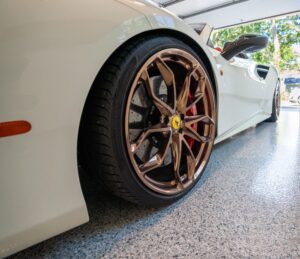
From practical needs to aesthetic preferences, installing a garage floor coating can improve your space by providing useful upgrades. The most common types of floor coatings are polyurea, polyaspartic, and epoxy, and each one has its own unique benefits. So, what is the best garage floor coating for you? Let’s dive right in and find out!
5 Benefits of Floor Coatings
Before you decide what the best garage floor coating is for you, it is helpful to have an overview of the advantages. You’ll find that there are several benefits that contribute to both the aesthetic appeal and functionality of the space.
Here are some of the key benefits of floor coatings:
1. Enhanced Durability: A garage floor coating, such as epoxy or polyurea, adds a robust layer that protects the underlying concrete from wear, cracks, and stains. This significantly extends the floor’s lifespan.
2. Improved Aesthetics: Floor coatings are available in various colors and finishes, providing the opportunity to enhance the overall look of the space. This not only contributes to a more visually appealing garage but also increases the resale value of the property.
3. Easy Maintenance: Coated garage floors are easy to clean and maintain. The smooth, non-porous surface prevents stains and makes it simple to wipe away dirt, oil, and other spills. This reduces the time and effort required for upkeep.
4. Cost-Effective: While the upfront cost may seem significant, they are cost-effective in the long run. This is because of their durability and low maintenance requirements, which ultimately save homeowners money over time.
5. Chemical, Dust, and Moisture Resistance: Garage floor coatings resist chemicals, such as oil and gasoline, to maintain a clean and undamaged surface. They minimize dusting, enhance air quality, and create a moisture-resistant barrier to prevent mold and mildew growth, especially in humid areas.
Now that we have an understanding of floor coating benefits, let’s discuss the differences between polyurea, polyaspartic, and epoxy.
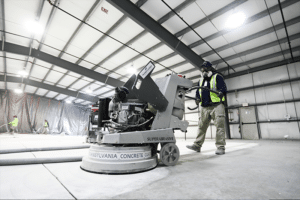
The Best Garage Floor Coatings: Polyurea, Polyaspartic, and Epoxy
Polyurea, polyaspartic, and epoxy are all popular choices for floor coatings, each with distinct characteristics. Polyurea is known for its fast curing time and excellent chemical resistance, making it suitable for rapid installations. Next, polyaspartic, a subset of polyurea, offers enhanced UV stability, making it a preferred option for outdoor applications.
On the other hand, epoxy is valued for its durability and customizable aesthetic options. This makes it a versatile choice for both residential and commercial spaces. The choice between these coatings often depends on factors such as application speed, UV exposure, and desired aesthetic qualities.
Still wondering what the best garage floor coating is for you? Let’s delve a little deeper into the three options.
Polyurea
Chemically, polyurea is a type of polyurethane formed through the reaction of isocyanates with polyether amines or water. Similar to epoxy, it consists of two parts – resin and catalyst – that, when mixed, undergo a curing reaction, resulting in a hardened material. Notably, polyurea is four times stronger and 98% more flexible than epoxy.
Polyurea is a versatile and high-performance floor coating known for its exceptional durability and rapid curing time. Formed through the reaction of an isocyanate component with an amine component, polyurea creates a flexible and resilient polymer. Its quick cure time, often makes it an ideal choice for projects that require a fast return to service.
Moreover, polyurea coatings have outstanding resistance to chemicals, abrasions, and impact. This makes them suitable for demanding environments such as industrial floors and high-traffic areas. Its high elasticity allows it to easily accommodate concrete expansion, contraction, and movement without the risk of cracking.
While slightly prone to yellowing when exposed to UV light, polyurea coatings offer reliable and long-lasting protection for a variety of surfaces.
Advantages:
- Exceptional durability and impact resistance.
- Rapid curing time, allowing for quick installations.
- Highly flexible (98% more than epoxy), accommodating concrete movement without cracking.
- Excellent chemical resistance.
- Suitable for high-traffic areas and industrial floors.
Disadvantages:
- Slightly prone to yellowing when exposed to UV light.
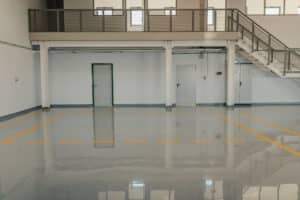
Polyaspartic
Polyaspartic is a special type of polyurea floor coating that is recognized for its unique properties and applications. It is formed through the reaction of an isocyanate component with a polyaspartic ester, creating a durable and flexible polymer.
What sets polyaspartic apart is its enhanced UV stability, attributed to the inclusion of an aliphatic polyisocyanate. This feature makes polyaspartic coatings resistant to yellowing when exposed to sunlight, making them particularly suitable for outdoor applications. Like polyurea, polyaspartic coatings offer fast curing times, allowing for quick installations.
Their versatility extends to high chemical resistance, abrasion resistance, and the ability to withstand temperature fluctuations without compromising performance. Polyaspartic coatings are a preferred choice for projects requiring both durability and aesthetic appeal, especially in environments with significant UV exposure. So, if you’re wondering “What is the best garage floor coating?” polyaspartic is one of your best options.
Advantages:
- Enhanced UV stability, resistant to yellowing.
- Fast curing time, similar to polyurea.
- Durable and flexible, suitable for various applications.
- Chemical and abrasion resistance.
- Ideal for outdoor use due to UV resistance.
Disadvantages:
- May have a higher upfront cost compared to epoxy.

Epoxy
Epoxy, while a popular flooring option, comes with certain limitations when compared to advanced alternatives like polyurea or polyaspartic coatings. It is a two-part system made from mixing resin and a hardening agent, resulting in a rigid surface. However, it lacks the flexibility of polyurea and polyaspartic, making it more susceptible to cracking under stress or temperature changes.
Additionally, epoxy is known to yellow when exposed to UV light, which ruins its appearance over time. Its longer curing time can extend installation periods, causing inconvenience for projects that require a quick turnaround.
While epoxy offers durability and customization options, coatings like polyurea and polyaspartic have surpassed it in terms of flexibility, UV resistance, and overall performance.
Advantages:
- Well-established and widely used.
- Durable and customizable with various color and pattern options.
- Cost-effective upfront compared to some alternatives.
Disadvantages:
- Prone to yellowing when exposed to UV light.
- Less flexible than polyurea and polyaspartic, making it more susceptible to cracking.
- Longer curing time, potentially extending installation periods.
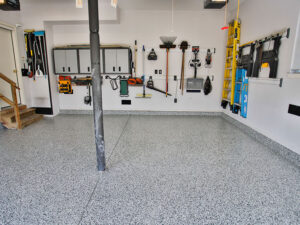
Get the Best Garage Floor Coating With Transylvania Concrete Coatings
In conclusion, the choice between polyurea, polyaspartic, and epoxy for garage floor coating hinges on a number of factors. Notably, the installation process of polyurea and polyaspartic requires only three layers, allowing a complete flooring system to be installed in just one day. This is a significant time-saving advantage over the epoxy system, which may demand your space for 3-4 days.
Furthermore, the temperature flexibility of polyurea and polyaspartic coatings, applicable in a wide range from -30°F to 140°F, surpasses the limitations of epoxy, which requires temperatures above 55°F. So, what is the best garage floor coating? Ultimately, the durability, flexibility, and quick installation of polyurea and polyaspartic coatings make them superior choices for garage floor coating.
At Transylvania Concrete Coatings, we’re here to make sure you don’t botch your DIY flooring project. Our professional team ensures a seamless and expert application, saving you time and guaranteeing a durable, aesthetically pleasing result. Contact us to transform your garage efficiently and enjoy the benefits of a professionally coated floor. Get a FREE quote today!

